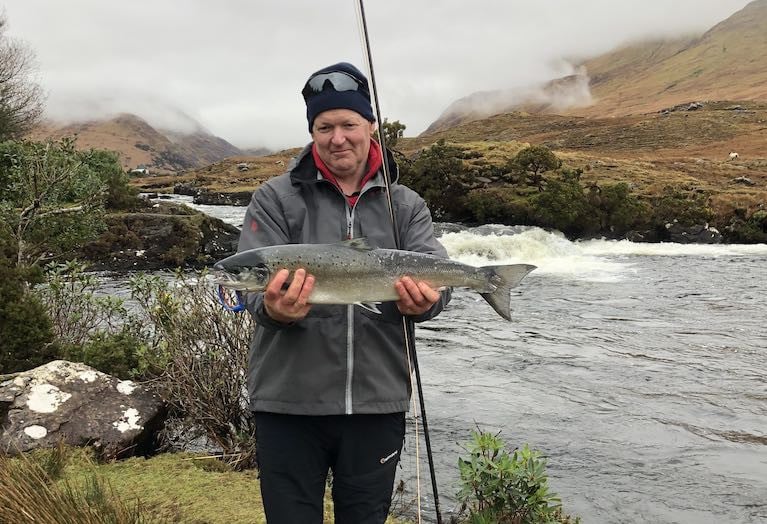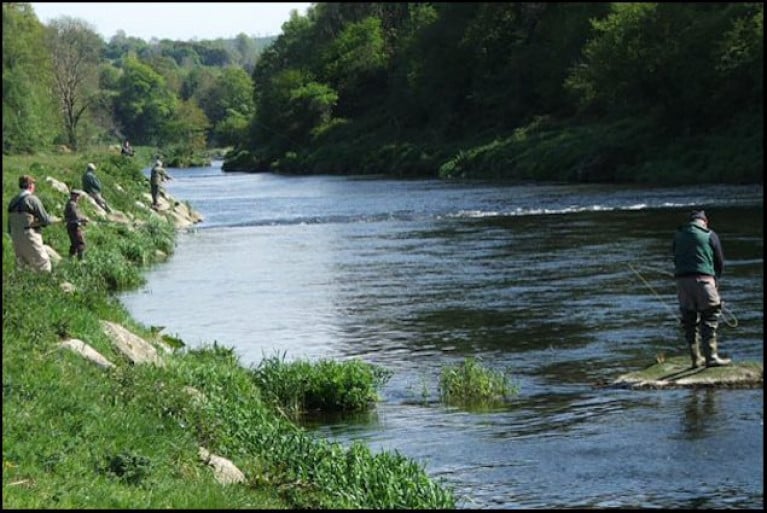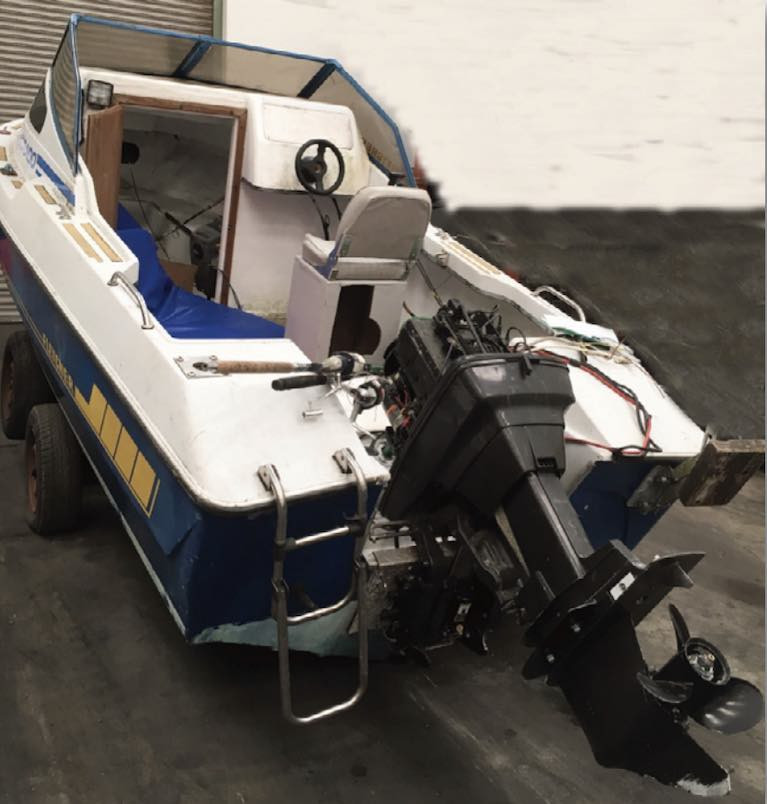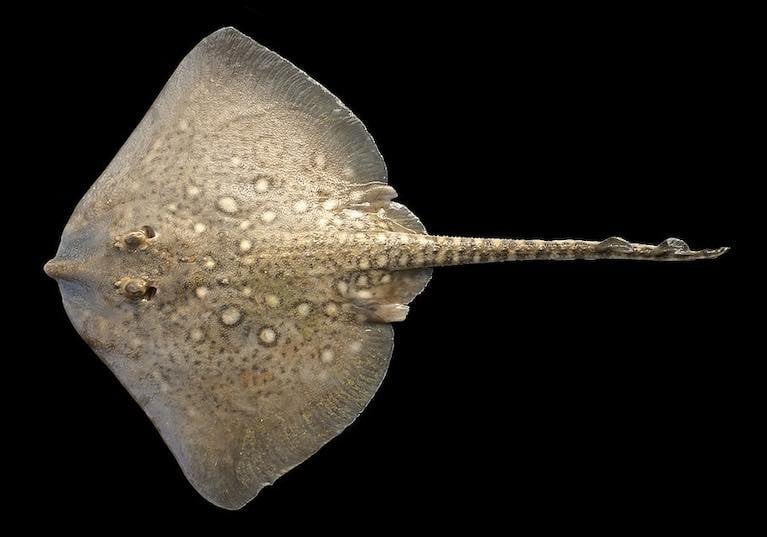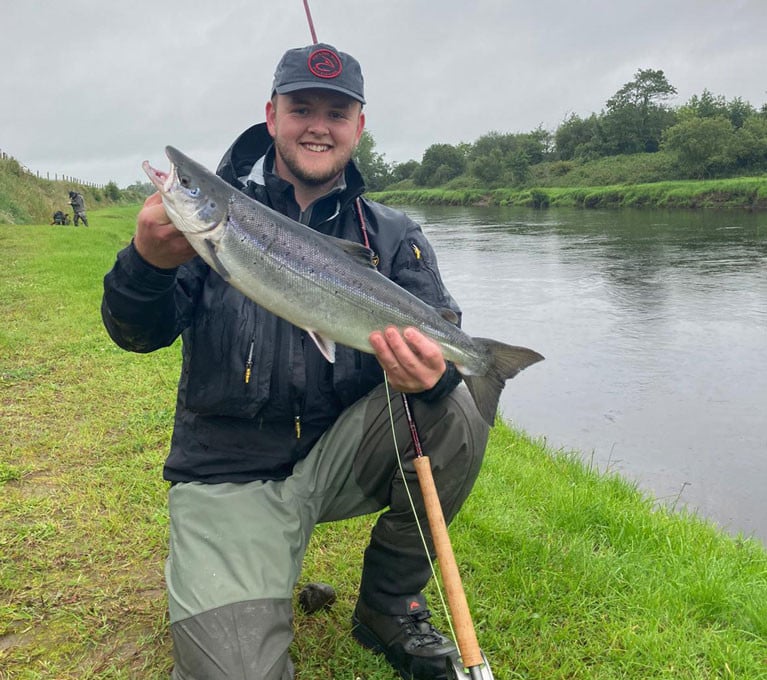Displaying items by tag: angling
Loughs Agency Collaborative Tree-Planting Effort Enhances River Faughan's Biodiversity and Conservation
Loughs Agency, in collaboration with Enagh Seniors Group and volunteers from River Faughan Anglers, recently organised a tree-planting event at Teenaght, situated along the scenic banks of the River Faughan near Claudy.
Approximately 150 willow saplings supplied by Enagh Seniors Group and 1000 native broadleaf trees supplied by the Woodland Trust were successfully planted along the riverbanks. This collaborative effort will provide shade and prevent erosion, as well as bank stability and leaf litter for young fish. It will also foster biodiversity and bolster conservation efforts by creating new nature corridors along the riverbanks.
Loughs Agency Fisheries Inspector, Jason McCartney expressed his satisfaction in utilising the area for the saplings. He said: “In 2023, Loughs Agency staff completed nature restoration projects in the upper reaches of the River Faughan. This consisted of creating 1.1 km of new riparian buffer zones, improvements to 350 metres of bankside stabilisation, and enhancements to 450 metres of salmonid spawning habitat.
“Within the last year, Enagh Seniors Group raised around 150 willow seedlings that were ready to be planted, and, following discussions, it was decided that these saplings would benefit from being planted at the site in Teenaght, further enriching the local environment. We were pleased to witness the planting of not only the saplings but also an additional 1000 native broadleaf trees, which will help restore the natural habitat and improve the biodiversity value of the River Faughan and its surrounding areas.”
Dr Robert Murtland of the Enagh Seniors Group also expressed his enthusiasm for the project: “Enagh Seniors Group was motivated to contribute to this initiative, which not only enhances the protection of the River Faughan but also secures its long-term sustainability for future generations.
“This initiative demonstrates the achievable results through collaboration within grassroots initiatives. It also highlights the importance of cooperative partnerships among local stakeholder organisations, such as Enagh Seniors Group and the River Faughan Anglers, in working alongside Loughs Agency in the conservation and protection of this iconic natural resource.”
Sean McLaughlin from River Faughan Anglers also commented on the positive collaborative work undertaken: “River Faughan Anglers were delighted to be involved in this project. It goes to show what great work can be achieved when like-minded organisations work together.
“The River Faughan is our home, and this project on the riverbank ties in perfectly with the in-river work carried out to maintain the Faughan as a thriving river for both salmon and trout for many years to come.”
Tributes Paid to John Dunford, Music Manager and Lover of The Sea
Tributes have been paid to the late John Dunford, the influential music manager who had recently qualified as a sea angling skipper.
As the Sunday Independent reports, Dunford loved the sea, bought a boat, and completed training with Bord Iascaigh Mhara (BIM).
Sadly, the 68 year-old father of four daughters from Mayo and living in Dublin passed away recently.
A celebrated music manager, sound engineer and co-producer, Dunford worked with many Irish musicians and set up the Hummingbird label.
He was best known as Sharon Shannon’s manager and long-time mentor and played a significant role in the early years of The Waterboys. He also worked with Planxty, Clannad, Moving Hearts, De Dannan and In Tua Nua among other groups.
A "mighty sound man, crew boss, travel companion, counsellor, fixer, co-producer, Irish trad music guide, partner-in-mischief, head, magic-seer and friend” is how Waterboys founder Mike Scott has described him on Twitter.
“He was the one with all the drive and passion that made my musical career what it is,”Sharon Shannon has said.
He was production manager, co-producer and location scout for The Waterboys, and located Spiddal House in An Spidéal, Co Galway, to record the Fisherman’s Blues album.
“A trip to Inis Mór on the Aran Islands, eating fresh lobster and drinking poitín in Nannie Quinn's house, and sailing back to Galway in a hooker the following morning in a force six gale,”was how he remembered that time in a subsequent interview.
Through his Hummingbird label, Dunford was involved in releasing albums by Sinead O’Connor, Donal Lunny’s Mozaic, John Spillane, The Monks of Glenstal and he worked with Philip King and Lunny on the 1991 /BBC/RTÉ/ Hummingbird five-part documentary “Bringing It All Back Home.”
Hailing from Castlebar, Co Mayo, John was the eldest in a family of five, and was immersed in music from a young age, playing with the La Salle group.
His brother, Steve, was also a musician and founding member of the group General Humbert, along with Mary Black. Steve Wickham’s tune “Dunford’s Fancy” on Fisherman’s Blues was named after Steve, who passed away several years ago.
Shannon has described John Dunford as a “natural leader with strong vision and powerful presence and huge charisma”, and “an amazing family man who was adored and idolised by his four daughters and his wife and his three grandchildren”.
He supported many charities in a quiet way, such as the Laura Lynn Foundation after his nephew Kevin died just three weeks short of his ninth birthday.
He was involved in setting up a school in Malawi, and he participated in the “Cycle for suicide” and raised funds for the Galway project, “Rosabel's Rooms”, named after the late Rosabel Monroe.
John Dunford is survived by his wife Hilly, and his daughters Becky, Hannah, Katy and Emily, brother Chuck, sister Derval and extended family.
Read The Sunday Independent here
Cork Man to Represent Ireland in Two Angling World Championships
Irish offshore survey company Green Rebel has sponsored a young angler from East Cork, Kevin Roche, for two upcoming Junior World Championship competitions. Roche, who hails from Shanagarry, is part of the Irish teams competing in the Netherlands and Cork.
The 18-year-old has been fishing in Ballycotton since he was six years old and began competing in the sport two years ago. Roche is a sixth-year student at Midleton CBS and wishes to pursue a career in the marine industry.
Roche will be participating in the Shore Angling World Junior Championships on the coast of Zeeland, Netherlands, from October 14th to 21st. He is also part of the Ireland Under 21 team competing in the World Boat Angling Championships in Crosshaven, Cork, from November 4th to 11th.
In September, Roche was crowned All Ireland Under 21 Champion at the Irish Federation of Sea Anglers’ boat competition in Rathmullen, Co Donegal. He has also secured his place in the Irish team for the Under 21 World Boat Championships in Donegal in August 2024.
Roche said, “It’s a huge opportunity to be part of the Irish team for two World Championships, and it means a lot to be sponsored by an ambitious company like Green Rebel. My passion is the sea. I don’t know many young people who are considering a career in fishing or the marine sector, but for me, there is nothing like it. The conditions in the Netherlands will be quite similar to Ireland for the shore angling competition, and we will be fishing for bass, flounder, dab, and dogfish. I have more experience in shore fishing, but I’m also looking forward to competing in Cork harbour in the World Boat Angling Championships.”
Founder of Green Rebel Pearse Flynn said, “We are proud to support local champions on the sea and are delighted to sponsor Kevin as he represents Ireland in two important angling World Championships. Kevin’s work ethic, incredible dedication to his craft, and ambition to make a career at sea is inspiring, and we know that he will go far.”
Green Rebel, which is headquartered in Cork, operates a fleet of vessels and aircraft to map vast areas of the ocean. It has a team of scientists, chemists, engineers, ecologists, vessel crew, and support staff across multiple locations in Cork and Limerick. Green Rebel offers offshore wind and other sectors an end-to-end set of data services that extend from acquisition, processing, interpretations, and reporting, with their fleet of purpose-built vessels, aircraft, floating LiDAR buoys, and in-house team of scientists and industry experts.
The Loughs Agency has made the decision to retain salmon carcass tag numbers for licence holders for the 2022 season in line with the previous year’s policy.
The Agency introduced the interim policy for the 2020/2021 season whereby the number of tags issued with a game angling licence was reduced to a maximum of one blue tag (1st March to 31st May) and two black tags (1st June to 31st October).
The principal objective of this measure is to carefully manage salmon in the Foyle system due to concern from within the Agency over conservation levels of the species. Based on the information collected in 2021, it appears there were fewer total fish in the Foyle system in 2021 than in 2020, and consequently a precautionary approach had to be adopted.
After careful evaluation, it was decided to maintain the previous position while introducing in-year reviews of the salmon runs based on fish counter data, annual angling returns and run strength.
Loughs Agency has undertaken a review of legislation and has come to the following conclusion: “It is the view of some stakeholders that the Agency should manage carcass tags on a catchment-by-catchment basis. The use of real-time figures can be beneficial in informing decision-making on the number of tags to be distributed per year, and how many tags can be given out for angling in each catchment.” This viewpoint is to be considered in regulatory changes once actions from the review can be implemented.
In the majority of rivers throughout Northern Ireland and in many locations globally, catch and release is now mandatory for salmon angling due to the pressures on sustainable populations. In these areas, no carcass tags are issued, and anglers are forbidden from retaining any fish. It is encouraging that most anglers in the Foyle area are aware of these pressures, and now voluntarily practice catch and release.
Loughs Agency also recognises the value of anglers on the rivers and their contributions towards sustainability. Considering this, the Agency has agreed to a compromise while still fulfilling obligations under the Habitats Directive. Salmon are a selection feature of Foyle Rivers that have been designated as Special Areas of Conservation.
In recent years this has led to the suspension of commercial salmon netting, while waters under the jurisdiction of Loughs Agency have subsequently been declared as catch and release only.
If you have any concerns over illegal fishing or pollution within the Foyle or Carlingford catchments, please contact the 24hr Loughs Agency Response Line on +(0)44 2871 342100.
81 Irish Rivers Open for Salmon Angling in 2022
The Minister for the Environment, Climate and Communications, Eamon Ryan TD, has approved legislation that will govern the wild salmon and sea trout fisheries in 2022. These will come into effect from Saturday, 1st January 2022.
Minister Ryan said: “81 rivers will be available for salmon and sea trout fishing in 2022. This will allow careful management of this important natural resource, for which conservation is paramount. 45 of the rivers will be fully open, with a further 36 available on a ‘catch and release’ basis. Improvements in stocks can only be achieved collaboratively over time and are entirely dependent on everybody redoubling our conservation efforts in the face of environmental, climate and human impacts.”
To inform the legislation for 2022, Minister Ryan received management advice from Inland Fisheries Ireland in relation to over 140 genetically individual wild salmon stocks in Ireland, which was supported by individual scientific assessments. The assessments were carried out by the Technical Expert Group on Salmon (TEGOS) – an all-island independent scientific group comprising experts from a range of bodies.
This advice was also made available as part of a statutory public consultation process. 100 written submissions were received from stakeholders during this process.
Management advice, based on the TEGOS assessment of rivers/estuaries/harbours, is that:
- 45 rivers to be open, as a surplus of fish has been identified in these rivers;
- 36 rivers to be classified as open for “catch and release” angling; and
- 66 rivers to be closed, as they have no surplus of fish available.
Minister Ryan added: “Ireland is internationally recognised for prioritising the conservation imperative as fundamental to our salmon management efforts. However, it is well over a decade since we adopted our current conservation policy. I believe the time to review and improve this policy has come. Therefore, I intend shortly to publish two policy papers on salmon for consultation. The first of these will explore new options for salmon management with conservation, and how to do it better as the key focus.
“Environmental, climate and human impacts continue to place salmon and other species at risk. I am determined that we raise awareness of all of these challenges. We will develop policy to ensure that we are doing all we can in Ireland, and as far as we can via international co-operation, to improve the resilience of our salmon.”
Connemara's First Salmon of the Year Caught in Delphi Fishery
Connemara’s first salmon of the year has been caught on the Delphi fishery, as Covid-19 restrictions keep many anglers away from their favoured riverbanks.
Delphi fishery manager David McEvoy was only angling for ten minutes when he hooked and landed a 6lbs 3 oz salmon in the “Waterfall pool” on the Bundorragha river, using a Willie Gunn tube fly.
Within an hour, the Delphi estate manager Michael Wade also caught a 6lbs fish in the river’s “Rockpool”.
Both catches recorded on February 1st – the first day of the season on the Bundorragha - have now been verified by Inland Fisheries Ireland (IFI).
There is usually keen competition in January to hook the first salmon, and the Drowes in Leitrim - which is one of the few rivers to open earlier than February 1st - has been claiming the honour in recent years.
However, Covid-19 restrictions on travel beyond five kilometres from home have kept riverbanks relatively quiet early this year.
The Delphi catch was the first to be hooked “on the fly”, while a 9.5 lb salmon was landed on rod and line on the Laune in Co Kerry on January 30th by Stephen Jordan.
IFI records the first fish which have been released and doesn’t tend to confirm fish caught which have been killed.
Mr McEvoy explained that as his was a ranched fish, it was killed, while Mr Wade’s fish was wild and was released.
All wild fish are released at Delphi, while ranched salmon – as in fish reared in hatcheries and then released - are removed.
“There is a saying that if the first fish landed is small, there will be a good season, but I think that is a bit of baloney,” Mr McEvoy said.
However, he does believe there will be a good spring run this year for a combination of reasons.
Wild salmon returned in record numbers to rivers in the west last year, but salmon expert Dr Ken Whelan cautioned that “one good salmon season” does not necessarily suggest a positive trend.
“We will really only know what is happening after scientists from Norway, Iceland, Scotland and Ireland meet in the autumn,” he said.
83 Rivers Open for Salmon Angling in 2021
Eamon Ryan T.D., Minister with responsibility for the Inland Fisheries sector has approved legislation that will govern the wild salmon and sea trout fisheries in 2021. These will come into effect from Friday 1 January 2021.
Minister Ryan said, “We are opening 83 rivers for salmon and sea trout fishing in 2021. This will allow careful management of this important natural resource, for which conservation will be to the fore.
In a positive trend, forty-nine of the rivers will be fully open, an increase of 20% on 2020, with a further thirty-four available on a ‘catch and release’ basis. Continued movement in a positive direction is only possible over time and is entirely dependent on everybody redoubling our conservation efforts in the face of environmental, climate and human impacts.”
"In a positive trend, forty-nine of the rivers will be fully open, an increase of 20% on 2020"
To inform the legislation for 2021, Minister Ryan received management advice from Inland Fisheries Ireland in relation to over 140 genetically individual wild salmon stocks in Ireland, which in turn was considered in the light of individual scientific assessments. The assessments were carried out by the Technical Expert Group on Salmon (TEGOS) an all-island independent scientific group comprising experts from a range of bodies.
This advice was also made available as part of a statutory public consultation process during which 33 written submissions from stakeholders were received.
Management advice based on the TEGOS assessment of rivers/estuaries/harbours is that:-
- 49 rivers to be open as a surplus of fish has been identified in these rivers;
- 34 rivers to be classified as open for “catch and release” angling; and
- 64 rivers to be closed as they have no surplus of fish available.
Minister Ryan said, “Ireland is internationally recognised for prioritising the conservation imperative as fundamental to our salmon management efforts and our contribution to the continuing global initiative that is the International Year of the Salmon 2020 has been second to none. Environmental and climate change and human impacts continue to place salmon and other species at risk. I am determined that the innovations of International Year of the Salmon, which continue to bring people together to share knowledge and raise awareness, will endure. This is key to ensuring the resilience of salmon in Ireland and in the entire North Atlantic”.
New Wild Salmon & Sea Trout Fisheries Legislation in 2021
Wild Salmon and Sea Trout Tagging Scheme (Amendment) Regulations S.I. No. 667 of 2020
These regulations provide for, the quotas of fish that can be harvested by commercial fishing engines and rod and line from those rivers identified in Schedule 2. The Regulations also provide for the use of brown tags in specified (low surplus) rivers which are identified in Schedule 4.
Angling Bye-law No. 982 of 2020
This Bye-law prohibits the use of any fish hooks, other than single or double barbless hooks, and also prohibits the use of worms as bait in angling for all species of fish in the waters specified in the Bye-law. This is to avoid the use of hooks and baits which are not conducive to fish survival and to ensure that the objective of C&R fishing is not frustrated.
Conservation of Salmon and Sea trout (Bag Limits) Bye-law No. 983 of 2020
Provides for an annual bag limit of 10 fish being either salmon or sea trout (over 40 cm) per angler and provides for a season bag limit of 3 fish in the period 1 January to 11 May, a daily bag limit of 3 fish from 12 May to 31 August and a daily bag limit of 1 fish from 1 September to the end of the season. The Bye-law also provides for the use of single or double barbless hooks and prohibits the use of worms as bait once the specified numbers of fish have been caught in the specified periods.
Conservation of Salmon and Sea trout (Catch and Release) Bye-law No. 984 of 2020
Provides for catch and release in respect of salmon and sea trout (over 40 cm) in rivers that are meeting at least 50% of their Conservation Limit as mentioned in the Bye-law. The Bye-law also provides for the use of single or double barbless hooks and prohibits the use of worms as bait in angling for salmon and sea trout over 40 cm.
Conservation of Salmon and Sea Trout (River Suir) Bye-law No. 986 of 2020
This Bye-Law provides for catch and release in angling for salmon (any size) and sea trout (over 40cm) in the River Suir (including the waters of the Rivers Clodiagh, Lingaun and Blackwater) and also prohibits the use of worms, prawn, shrimp or any other crustacean, or artificial forms thereof, as bait and any fish hooks other than single or double barbless hooks during the period 17 March to 30 September.
Conservation of Sea Trout Bye-law No. 987 of 2020
This Bye-law provides for a daily bag limit of 3 sea trout (less than 40 cm in length) and provides for the use of single or double barbless hooks and prohibits the use of worms as bait once the specified number of sea trout have been caught.
Conservation of Salmon and Sea Trout (River Slaney) Bye-law No. 985 of 2020
This Bye-Law provides for catch and release in angling for salmon (any size) and sea trout (over 40cm) in the River Slaney and also prohibits the use of worms, prawn, shrimp or any other crustacean, or artificial forms thereof, as bait and any fish hooks other than single or double barbless hooks.
Conservation of Salmon and Sea Trout (Closed Rivers) Bye-law No. C.S. 331 of 2020
Prohibits the taking or attempting to take by rod and line salmon and sea trout (over 40 cm) in the rivers specified in the Bye-law.
MCIB Report Identifies Lack of Planning & Communication Difficulties in Report on Deaths of Two Men in Sea Angling Incident off Donegal
Lack of sufficient planning and lack of adequate emergency communication were factors in an incident where two of three men on a sea angling trip lost their lives off the Donegal coast over two years ago.
“Restrictive” procedures with the Emergency Call Answering Service (ECAS) also meant the men on board the vessel were in the water for five hours before the alarm was raised, the Marine Casualty Investigation Board (MCIB) report has found.
Two drafts of the MCIB report were circulated as part of a comprehensive investigation into the deaths of Gerry 'Malin' Doherty, who was in his sixties, and Thomas Weir (16) off Portronan, north Donegal, on July 17th, 2018.
A third man who is in his late 40s, survived after he clung onto a buoy for five hours before being spotted and brought to safety. He was the only one of the three wearing a personal flotation device.
The three had set out on a 5.9m (19 ft) glass-reinforced plastic craft from Port Ronan pier around 9 am that morning, and fished for over an hour. They were unable to restart the engine, and a wave washed over the hull and capsized it.
The report finds that seven factors contributed to the severity of the incident including the fact that the boat was anchored from the stern, making it more susceptible to being swamped in “any type of sea”.
The MCIB report notes that a crew member tried to make an emergency call on a British mobile phone, but as the call was being put through the phone fell into the water. There was no VHF radio onboard.
The emergency call was received by the ECAS centre but the report says that “restrictive procedures” were “not sufficiently flexible for a situation which required the ECAS operators to be more proactive in transferring all the information available to the Coast Guard”.
“Because the information in the recording of the emergency call was not transferred shortly after 10:16 hrs. the casualties were in the water for five hours,”the report says, and “this increased the severity of the incident”.
Marine communications are very different from land-based communications and the ECAS system is a land-based emergency call answering system with limitations for use at sea.
The MCIB report says that a mobile phone should not be relied on as the primary method of contacting emergency services and says that VHF radio as the primary means of contacting emergency services should be used by all boat owners in all instances, including in competitive sailing events.
The MCIB says that since the incident, the Irish Coast Guard has protocols in place for handling emergency calls and ECAS has also “updated policies.
However, it says that the Minister for Climate Action, Communication Networks and Transport should consider whether the Irish Coast Guard and ECAS “should have these policies, their implementation internally, and their coordination with each other, suitably reviewed and or audited”.
The MCIB report is here
Anglers Express Concern Over Demise of Thornback Ray on Belfast Lough
Alex Easton, MLA has called on the Department of Environment, Agriculture and Rural Affairs (DEARA) Minister to create Marine Protections Areas in Belfast Lough.
Belfast Lough is a long, wide, and deep expanse of water, virtually free of strong tides lying between County Antrim and County Down. The inner part of the Lough comprises a series of mudflats and lagoons, and the outer Lough is restricted to mainly rocky shores with some small sandy bays. The outer boundary of the Lough is a line joining Orlock Point on the County Down side and Blackhead on the County Antrim coast, giving about 30 square miles (78 km2) of open water.
The Northern Ireland Federation of Sea Anglers brings together all the sea angling people of Northern Ireland whether fishing shore or boat. Members recently met at Bangor Marina with DEARA Minister Edwin Poots, South East MP Paul Girvan and MLAs Alex Easton and Gordon Dunne. The meeting gave NIFSA the chance to highlight the federation's concerns, amongst which was the reintroduction of the Thornback Rays into Belfast and Larne Loughs, the setting of artificial reefs and the creation of Marine Protection Areas within the Lough.
 Minister Edwin Poots (left) meets anglers Harry McKee (Secretary of NIFSA) and Barry Platt (right) Photo: NIFSA
Minister Edwin Poots (left) meets anglers Harry McKee (Secretary of NIFSA) and Barry Platt (right) Photo: NIFSA
Mr Easton has said "It is quite clear that commercial fishing in Belfast Lough over many years has decimated many types of fish and wildlife within the Lough. Having spoken to anglers, they no longer catch many of the different species they once did due to overfishing by commercial fishing."
He continued, "A clear example of this is the Thornback Ray which was once abundant in the Lough and is now extinct due to commercial fishing. I would love to be able to see these Rays reintroduced to Belfast Lough, but to do this we would need a survey done of the Marine life, the creation of artificial reefs to support and grow fish numbers and the creation of Marine protection areas around Belfast Lough that cannot be fished by commercial fishing".
Alex Easton intends to write to the Agriculture and Environment Minister, Edwin Poots, about these matters. He continued. "I believe we have time to fix and protect Belfast Lough in a way that we can reintroduce wildlife such as the Thornback Ray, which can be bred at our own Exploris Aquarium Visitor Centre in Portaferry and reintroduced to Belfast Lough. We can ensure that the area is sustained for anglers to fish, which ensuring we grow and protect our Lough but is done sustainably."
Wild Atlantic salmon are returning in “record” numbers to rivers along the Atlantic seaboard, according to fishery managers.
As The Sunday Times reports, Inland Fisheries Ireland regional director Francis O’Donnell says this year’s season appears to have “bucked the trend”.
Mr O’Donnell, who has responsibility for the western river basin district, said there were high numbers of healthy fish on Galway’s Corrib system, Mayo’s River Moy and Ballisodare in Sligo
IFI is deploying extra patrols to detect poaching, and inspecting premises ashore, he said. Fish are believed to be fetching between 50 euro and 90 euro per salmon.
 Michael Mahnke - With a morning's catch from Mount Falcon river Moy in July 2020
Michael Mahnke - With a morning's catch from Mount Falcon river Moy in July 2020
However, scientific expert Dr Ken Whelan, director of the Atlantic Salmon Trust, urges caution on the numbers.
Commercial driftnet fishing for wild salmon in Ireland was banned in 2007, and license holders were offered a small compensation package by the then government.
“It’s not just the numbers returning this year, but the size and good condition of the fish,” Alan Maloney, owner of the Mount Falcon Hotel in Co Mayo, said.
The hotel has a two-mile stretch of the River Moy, and anglers caught 290 fish in July, he said.
Dr Whelan said that he was aware of the reports, but cautioned that “one good salmon season” does not necessarily suggest a positive trend.
 David Morris playing his first-ever fly caught salmon Mount Falcon River Moy in July 2020
David Morris playing his first-ever fly caught salmon Mount Falcon River Moy in July 2020
“We will really only know what is happening after scientists from Norway, Iceland, Scotland and Ireland meet in the autumn,” he said.
Read more on The Sunday Times report here



























